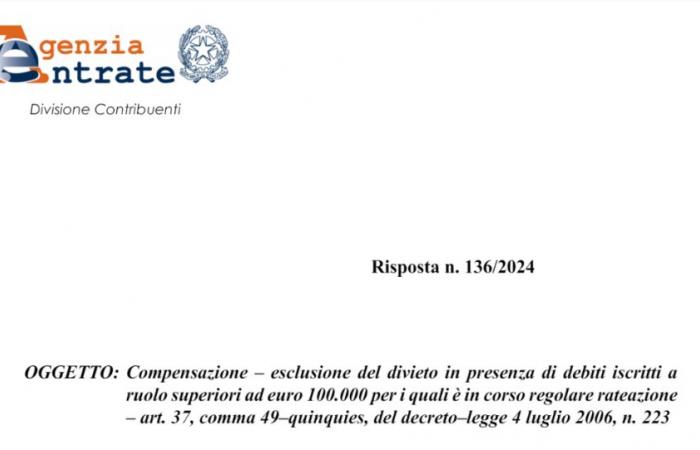The Revenue Agency clarifies the application of ban on compensation with F24 form for large debts exceeding 100,000 euroseffective next year July 1st.
The ban does not apply to debts that are the subject of plans installment with regular payments.
The clarifications in the response toquestion number 136 of 20 June 2024.
Prohibition of compensation for registered debts: does not apply in the case of regularly paid instalments
With the answer toquestion number 136 of 20 June 2024the Revenue Agency sheds light on the application of ban on compensation with F24 form for debts registered in the register exceeding 100,000 euros.
The clarification comes in response to the question of the applicant, a company:
- whose debts towards the Revenue Agency, of amount exceeding 100,000 eurosare the subject of plans installment for which no forfeiture occurred;
- which has tax creditsincluding some deriving from superbonus, pursuant to art. 119 of Legislative Decree 34/2020.
In light of prohibition you can bring in compensation tax credits in the case of debts for which tax relief has been granted installment? These limits apply to credits arising from building bonusesbeing tax credits of facilitative nature?
The applicant believes that, due to thecurrent regulatory context and in practice, the prohibition compensation for amounts exceeding 100,000 euros does not apply:
- for any type of credit that is intended to be compensated, in the cases of installment whose payments are regular;
- regardless of the acceptance of an installment request, if the credits that are intended to be offset derive from building bonuses.
The Revenue Agency does not fully confirm the company’s interpretation since, as will be seen below, this issue has been the subject of multiple revisions regulations.
In any case, the Revenue clarifies that the prohibition in question does not apply in the case of debts registered in the register for which the installment if the relatives payments are regular.
In this case it is specified that the prohibition applies to all creditsincluding those of a facilitative nature and with theexception of social security and welfare contributions and insurance premiums, in the case of sums exceeding 100,000 euros.
The ban would therefore also apply to construction bonuses but only starting from July 1st.
Ban on compensation with regular installments: what’s new in the regulatory framework
Within the response, the Revenue Agency summarizes the new regulatory framework in the field of use of credits in compensation.
The paragraph 3-bisintroduced toart. 121 of Legislative Decree 34/2020 from the art. 4 of Legislative Decree 39/24, provides that for overall amounts exceeding 10,000 euros for which it intervened forfeiture of installment paymentsthe possibility of compensation is suspended until the amounts are reached of the aforementioned roles and duties.
However, the terms of use of the individual annual installments of the credits remain unchanged.
The implementation methods and the effective date of the provisions are referred to a regulation which must be approved by the Minister of Economy and Finance.
As already anticipated, moreover, with effect from 1 July 2024 it is envisaged that the prohibition does not apply with reference to sums covered by installment plans for which forfeiture has not occurred.
Finally, as highlighted by the Revenue Agency, the new regulatory interventions therefore pave the way for compensation even in the presence of large debts, if there is an ongoing debt settlement for them installment plan punctually honored.
- Revenue Agency – Response to question number 136 of 21 June 2024
- Exclusion of the compensation ban in the presence of debts exceeding 100,000 euros for which regular installment payments are underway.






